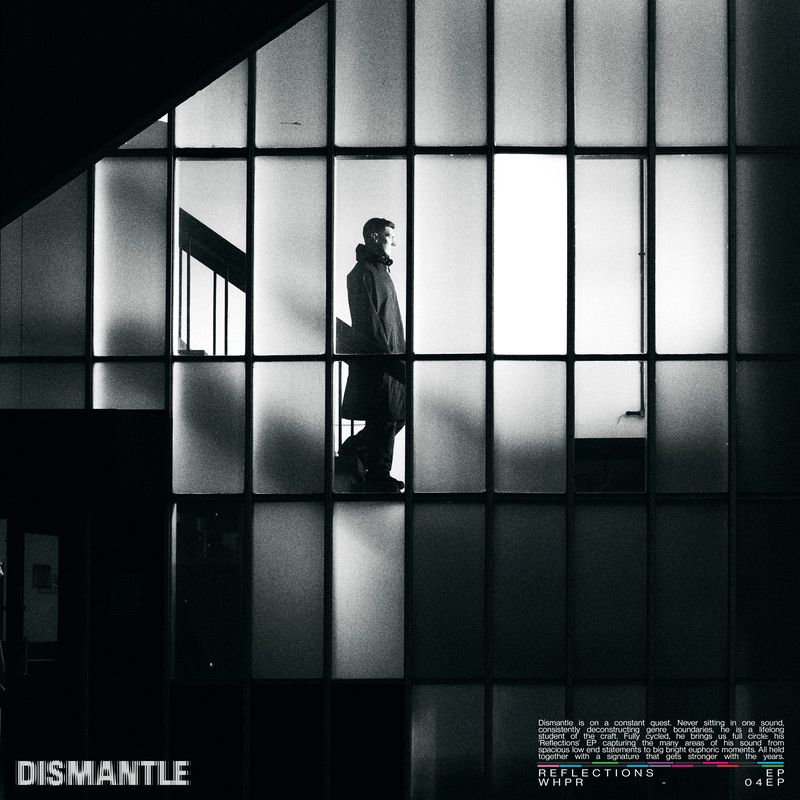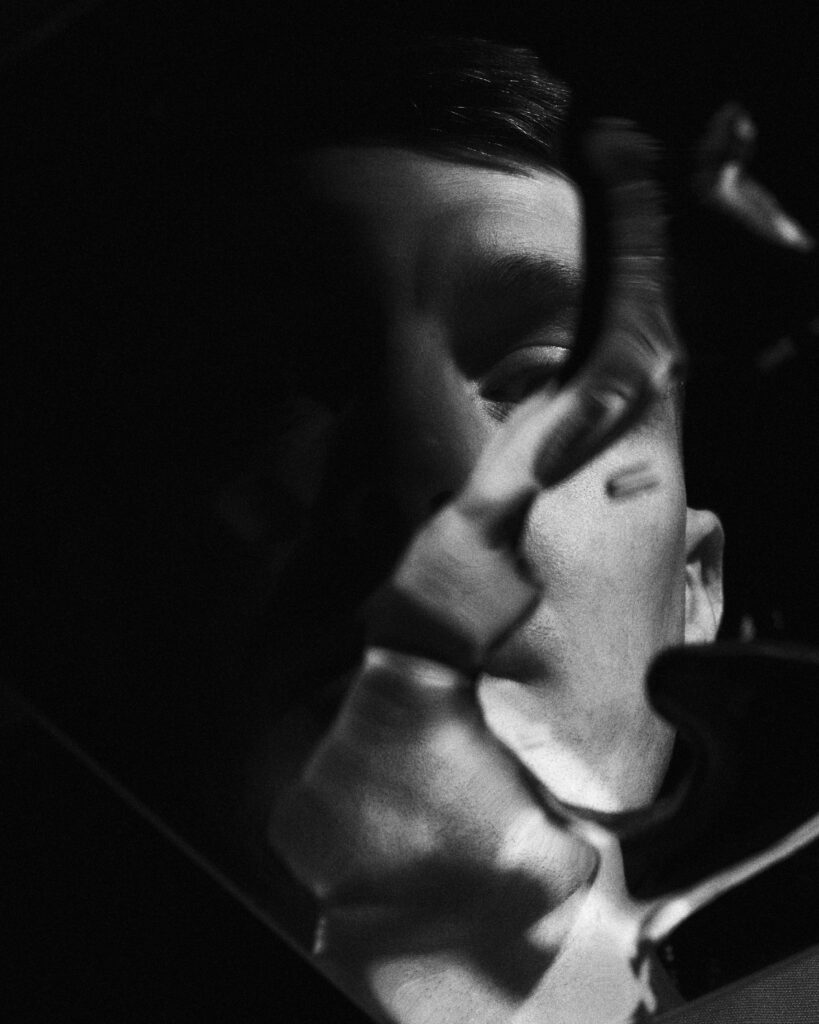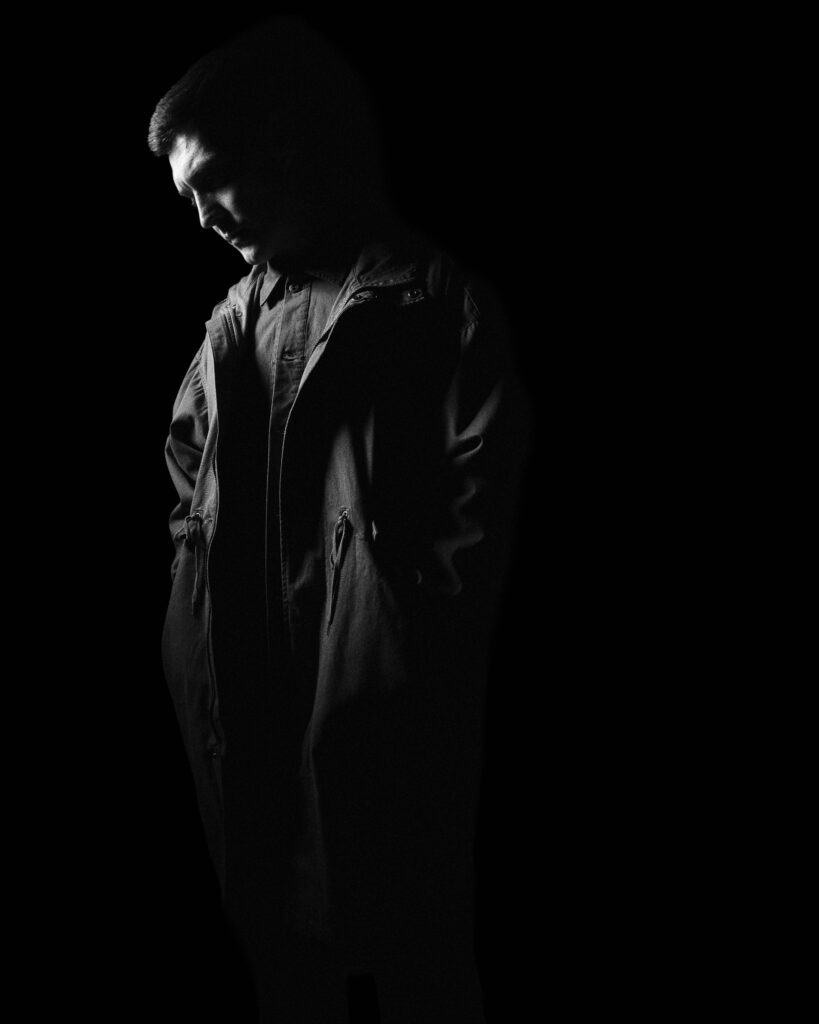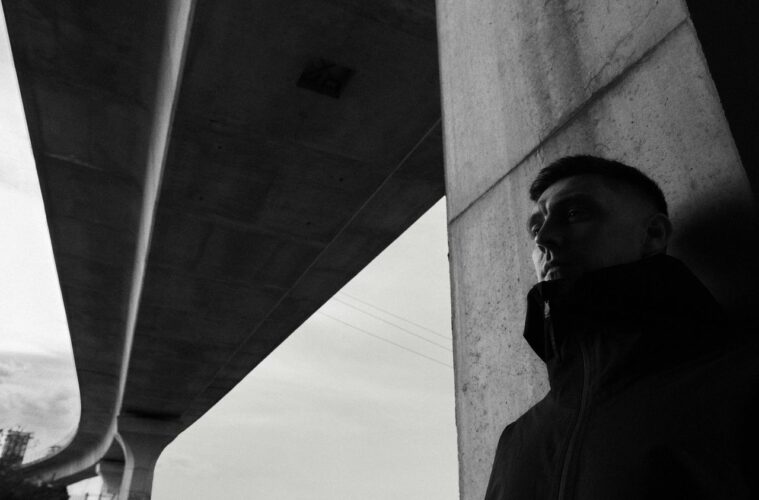Dismantle è un artista dalle mille facce, tante quante i suoi alias e progetti collaborativi che ha voluto inserire nel suo ultimo EP Reflections, uscito il 7 novembre su Warehouse Project Records.
Siamo riusciti per l’occasione a fare qualche domanda a Will Knighton aka Dismantle, che da oltre 10 anni comanda ormai la scena Jungle e DnB di Bristol (oltre che di tutto il mondo), collaborando con Skrillex, Nia Archives e Shy FX e ridefinendo il genere a modo suo.
Dall’amicizia di lunga data con Die e le release come “Diemantle“, fino all’incontro con Randall e la nascita di “Watch the Ride“, che hanno portato sulla mappa mondiale la Jungle made in UK. L’ascesa di Dismantle passa attraverso un movimento (quello di Bristol) che ha influenzato inevitabilmente il suo percorso artistico, rendendo genuino il suo successo.

Ciao, benvenuto su Parkett! Hai appena firmato con Warehouse Project Records per il tuo nuovo EP di 6 tracce, Reflections, in uscita il 7 Novembre. Cosa dobbiamo aspettarci e cosa rappresenta per te questo lavoro?
Yo! Grazie per l’invito! Questo EP è una specie di fotografia del punto in cui mi trovo oggi come produttore. Ho voluto racchiudere dentro tutte le esperienze e le influenze accumulate negli ultimi 15 anni tra progetti diversi, collaborazioni e alias vari. Ci sono un paio di tracce che riprendono elementi del mio sound bass più recente, su cui ho lavorato molto, ma stavolta ho cercato di spingermi un po’ oltre: arrangiamenti più lunghi, più emozione e musicalità, e non solo il classico schema intro-drop da club. Alcune idee arrivano dal mio alias Nuff Pedals, quindi con tocchi jazz ed elementi più sperimentali.
C’è anche un ritorno alle mie radici 4×4 e all’esperienza nella drum’n’bass maturata con Watch The Ride, che mi ha aiutato molto nel mix e nell’ingegneria del suono. In generale, volevo mettere insieme tutte queste parti di me in un unico progetto, un modo per reintrodurmi come artista solista su un’etichetta importante come Warehouse Project.
Bristol è una città culturalmente fortissima quando si parla di elettronica. Quanto sei legato alla città e quanto ha influenzato il tuo percorso?
Sono cresciuto a Brighton fino ai vent’anni, poi mi sono trasferito a Bristol nel 2014 e non me ne sono più andato. Avevo già contatti e collaborazioni qui, quindi il passaggio è stato super naturale. Mia madre è cresciuta a Saltford, poco fuori Bristol, quindi conoscevo già la zona e ci venivo spesso da piccolo.
Non posso dire di avere radici profonde come alcune colonne della scena, ma arrivando qui e iniziando a lavorare con gente come Die, Sam Interface (Jus Now), Mensah NYTA e tanti altri che ho conosciuto tramite loro, ho avuto davvero un ottimo ingresso in città. Bristol ha sicuramente plasmato la mia musica e il mio modo di produrre.
Quando sono arrivato avevo proprio voglia di sperimentare: nel 2015 ho iniziato a studiare teoria jazz e tastiere, e da lì è nato Nuff Pedals. Già tra il 2012 e il 2013 ero ossessionato dal broken beat, e vivere qui mi ha aiutato a trasformare quella passione in qualcosa di concreto. La cosa bella di Bristol è la varietà: drum’n’bass, jungle, dubstep, house, broken beat… ogni scena ha il suo pubblico e la sua energia. Nonostante la chiusura di alcuni club storici, ogni settimana succede sempre qualcosa musicalmente.
Cosa ne pensi della scena oggi? Sembra esserci un gradito ritorno della Bass, sia nei club che nei festival. Dove vedi l’evoluzione del genere dal tuo punto di vista?
È bellissimo vedere così tante micro–scene della bass music in grande forma. Ora è normale trovare line–up super diverse, con artisti che portano ognuno il proprio mondo. C’è molto più crossover tra generi, e i DJ possono mixare pezzi inaspettati anche durante set completamente orientati a un altro stile.
È fondamentale che succeda, perché è proprio da questi incroci che nascono nuovi suoni e nuove idee. Ed è così che la dance music UK continua a muoversi e a evolversi.
Hai fatto parte di Watch The Ride insieme a DJ Die e al compianto Randall. Come vi siete conosciuti e com’è nata un’avventura che vi ha portato all’incontro con Nia Archives e al successo internazionale?
Ho iniziato a lavorare con Die nel 2013–14, ancora prima di trasferirmi a Bristol. All’inizio sperimentavamo un po’ di tutto, vari bpm e generi diversi. Abbiamo pubblicato dei brani con la Digital Soundboy di Shy FX e con Gutterfunk, la label di Die. Abbiamo continuato per qualche anno come DieMantle, e nel frattempo Randall aveva iniziato a passare spesso in studio o da Die. Era circa il 2016.
In maniera molto naturale abbiamo iniziato a scrivere più tracce jungle e il sound si è fatto più veloce, così Randall poteva suonarle nei suoi set. Nell’estate 2018 ci hanno proposto un b2b con lui: tecnicamente è stato il primo show dei futuri Watch The Ride, anche se allora eravamo ancora “Randall b2b DieMantle”.
Da lì abbiamo deciso di dare una vera identità al progetto e iniziare anche a scrivere musica insieme. Randall ha fissato una sessione con D Double E e nel 2019 è nato Original Format. Poco dopo abbiamo firmato con Rinse. Dopo un paio di EP e singoli siamo entrati in studio con Nia Archives e abbiamo creato Mash Up The Dance. Nel frattempo stavamo già suonando un sacco di date in giro per il Paese e Mash Up The Dance è arrivata nella B List di Radio 1.
Gira da un po’ online un ID di Skrillex & Dismantle, apparso durante il Coachella 2023. Quante altre collaborazioni nascoste ci sono nel tuo laptop che potrebbero – oppure no – vedere la luce un giorno?
Sì, ci sono un sacco di demo che girano, haha. Cerco di tenere sempre aggiornati i DJ e gli amici più stretti che suonano molto, così possono testare i pezzi nuovi. Ho cartelle piene di roba che probabilmente non uscirà mai.
Quando scrivo penso sempre: “È abbastanza forte per uscire?” e a volte mi servono anni per riascoltare certe idee. Di solito, se un brano inizia a girare online o viene IDato, quello è un buon segnale per farlo uscire.
Curiosamente, i miei pezzi preferiti sono quasi sempre quelli che non vengono notati subito: quelli più melodici o meno orientati alla dancefloor. Ho scritto un paio di tracce con Skrillex e una dovrebbe uscire entro l’anno prossimo. Lavorare con lui è stato top, super disponibile e sempre entusiasta di quello che gli mando. Non vedo l’ora che esca quella traccia!

ENGLISH VERSION
Dismantle is an artist with a thousand faces, as many as the aliases and collaborative projects he’s folded into his latest EP, Reflections, released on November 7th via Warehouse Project Records.
For the occasion, we had the chance to ask a few questions to Will Knighton, aka Dismantle, who has been holding down the Jungle and DnB scene in Bristol (and far beyond) for over a decade, collaborating with Skrillex, Nia Archives and Shy FX, and reshaping the genre in his own way.
From his long-standing friendship with Die and the releases as Diemantle, to his encounter with Randall and the birth of Watch The Ride, a project that helped put UK-made Jungle on the global map. Dismantle’s rise is deeply rooted in the Bristol movement, which inevitably shaped his artistic journey and made his success feel all the more authentic.

Hi, welcome to Parkett! You just signed to Warehouse Project Records for your upcoming 6-track EP, Reflections, coming on the 3rd of October. What could we expect from it and what it represents for you?
Yo! Thanks for having me on! The EP is basically a snapshot of where I’m at right now as a producer. I wanted to bring in elements from all the experiences and influences I’ve picked up across the different projects I’ve been part of over the last 15 years. That includes both collaborative work and the various aliases I’ve used over time.
There are a couple of tracks that lean into the more current bass sound I’ve been exploring, but I also wanted to push things further by working on longer arrangements and focusing more on emotion and musicality — rather than just sticking to a straightforward intro–drop format for the clubs.
Some tracks, and the EP as a whole, also draw inspiration from my Nuff Pedals alias, bringing in jazz touches and more experimental ideas. There’s a bit of my early 4×4 sound in there too, as well as influences from my time writing drum’n’bass with Watch The Ride, which helped me develop my own mixing and engineering.
Overall, I wanted this project to bring all these sounds, experiences and influences together — a way to reintroduce myself as a solo artist on a label as big as Warehouse Project.
Bristol is a very culturally prolific city when it comes to electronic music. How deep are your roots with the city and how has it shaped your evolution as an artist?
I grew up in Brighton through my early twenties, then moved to Bristol in 2014 and have been here ever since. I was lucky because I already knew and was working with a few people from Bristol, so moving here felt very natural. My mum grew up just south of the city, in a place called Saltford, so I already had a connection and visited often as a kid.
My roots aren’t as deep as some of the original Bristol heads, but coming here and working with people like Die, Sam Interface (Jus Now), Mensah NYTA and all the others I met through them and through playing shows — that gave me a strong introduction. Bristol has definitely shaped my music and who I am as a producer.
There are parts of Die’s influence that you can clearly hear in my sound, and when I first moved here I was in a place where I wanted to be much more experimental. I started learning keys and jazz theory in 2015, which led to my Nuff Pedals alias. I was already obsessed with broken beat around 2012–13, and being in Bristol — surrounded by people like Die — made me want to develop that sound into something releasable.
One of the best things about Bristol is how many different micro-scenes thrive here. Of course you have drum’n’bass and jungle, but there are also strong dubstep and house communities, and more niche scenes like broken beat. Even though we’re sadly seeing some iconic clubs closing, there’s still so much happening musically in the city every single week.
How do you see the scene today? There seems to be a resurgence of the Bass movement, both in clubs and festivals. How is the genre evolving from your perspective?
It’s really great to see so many pockets of bass music thriving right now. It’s amazing to see such varied line-ups, where every artist brings their own sound and identity. There’s a really nice crossover between different scenes, and DJs can pull wildcards from other genres even while playing sets that are focused on something completely different.
That’s important — when these overlaps happen, new sounds and ideas emerge, which ultimately helps push the boundaries of UK dance music forward.
Along with DJ Die and the late Randall you were part of Watch The Ride. How did you meet them and how did everything come together from the start up to your meeting with Nia Archives and worldwide support?
I started working with Die around 2013–14, before I moved to Bristol. When we first started writing together we were experimenting with different BPMs and genres. We released a couple of records on Shy FX’s Digital Soundboy and on Die’s own label, Gutterfunk.
We kept working as DieMantle for a few years, and during that time Randall started coming to our studio sessions or hanging at Die’s place. This was around 2016. Naturally, we started writing more jungle, and the music got faster so Randall could play it out.
In the summer of 2018 we got offered a b2b with Randall — the very first time Watch The Ride ever played out, although at that point we were still billed as Randall b2b DieMantle.
From there we decided to turn those b2bs into a proper project, so we could both perform and write music together. Randall set up a session with D Double E, and in 2019 we recorded “Original Format”. After that we signed to Rinse.
After releasing a couple of EPs and singles, we got in the studio with Nia Archives and wrote “Mash Up The Dance”. By then we were already doing some amazing shows around the UK, and the track ended up landing on Radio 1’s B List.
There’s a Skrillex & Dismantle ID waving around the internet since Coachella 2023. How many more hidden gems and never-seen collaborations are sitting in Dismantle’s laptop that could (or could not) see the light one day?
Yeah, there are a lot of demos floating about haha. I just try to keep the DJs and close friends who play out a lot updated with the latest bits. I’ve got folders full of stuff that probably won’t ever come out.
When I’m writing, I always think: “Is this good enough to release?” — and sometimes it takes years before I circle back to an idea. Usually if a track starts getting attention online or gets ID’d, that’s a good sign it might be worth releasing.
Funny enough, my favourite tracks are usually the ones that don’t get picked up quickly — the more melodic or less dancefloor-driven ones.
I’ve written a couple of tracks with Skrillex, and one of them should be coming out in the next year or so. He’s been amazing to work with and super supportive of everything I send him. I’m really excited to get that one out there!


